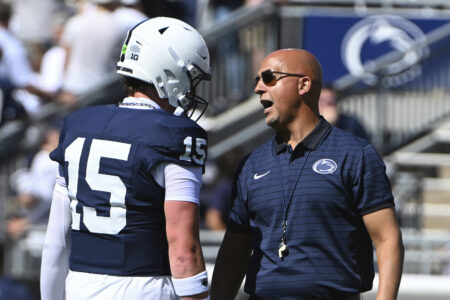Confidence is built up through preparation
Confidence, where does it come from? Why are some people and or players confident while others lack any?
A very common statement in youth and high school sports is to hear players and parents alike saying that their coach doesn’t have any confidence in them or their son or daughter, so they don’t have any confidence in themselves.
To that I have two questions. First, I must ask the player, do you have any confidence in yourself? Second, have you done anything to give the coach a reason to have confidence in you?
Those are big questions which require some true introspection.
Yes, it is easy to blame a coach when you feel they lack confidence in your ability to produce on the field, mat, court or track. However, if you are to be honest with yourself, you need to consider whether the coach expressing confidence in you is warranted.
Now to be clear, coaches have a responsibility to give their best effort to all players and be positive in their interactions with them. They must do all they can to instill within players a positive mindset and teach them how to play the game as best as is possible.
In the end, the player must have confidence in themselves and thus demonstrate to the coach that they are deserving of their confidence.
So where does the confidence ultimately come from? Through preparation. Only when a player is properly prepared will they be confident.
Does the coach play a role in that? Yes, they surely do. Does the player? Absolutely. Do parents as well?.
Players will be confident when they have demonstrated in their preparation that they are in fact prepared. How can a player be confident in those difficult situations? Will it happen simply because a coach tells them that they believe in them?
While that helps, it will not be sufficient. Again they will be confident only when they are prepared. They must be prepared, mentally and physically. They must be in shape. They must trust their skills. They must know their assignments. They must trust their ability to perform in the biggest of moments.
However that does not happen just because a coach says I have confidence in you.
Think of it this way, a parent or teacher can tell a student that they are confident that they can pass a test. However if the student didn’t pay attention in class and they failed to study for the test, they are not likely to pass the test. The teacher or parent expressing confidence in the student is futile.
What would give the student the best chance to pass the test? Preparation.
Another example: why are most 16-year-olds timid when they get behind the wheel for the first time? Simple answer, they are not confident because they haven’t had time to get prepared to be so. It will take time. They will need to spend time behind the wheel before they develop confidence.
A common argument that players and/or parents will often use in this regard is that a player can’t gain confidence playing in a game if they don’t get in the game and play. If we go back to the idea of preparation, we will understand that it reverts back to the idea that preparation comes before confidence and that comes before game play.
Has the player prepared and demonstrated on a regular basis in practice situations that they are ready and capable of performing in a game? Additionally, will they have confidence when they are in the game?
The likely answer to those two questions is that only if the player is prepared and has demonstrated on a regular basis that they are prepared will they have confidence when they enter a game.
So we revert to responsibilities. What responsibility does the coach have in helping to instill confidence in a player?
First, they must teach them the skills necessary to have success in a game situation. Additionally, they must provide the player ample opportunities to practice those skills and situations that will best prepare them to have confidence when they enter game play. They must speak honestly but supportively to the player.
What about the player? The player is responsible for preparation as well. They must be a good student of the game. In other words, they must be coachable. They must work to master the skills of the game. They must understand their assignments once in a game.
Finally, they must have demonstrated to themselves first and then their coach repeatedly in practice sessions that they are ready for game play.
Parents, you need to express confidence in your athlete while at the same time being honest with them about their abilities. Do not be negative with them and then expect that they exude confidence or for the coach to compensate for the sense of confidence that you failed to instill within your own athlete.
I don’t imply that all parents are negative with their athletes. Some are, but some are very positive and then others are overly positive.
The truth delivered positively is key. Once these things have all taken place, the player is likely ready to have the confidence necessary to perform at a respectable level. All play a critical rule in whether a player has confidence.
Unfortunately, developing confidence within an athlete is not as simple as flipping a switch to turn on a light. Confidence breeds confidence. If a player is confident, their play is likely to be solid, which will help them to build more confidence and on and on it goes.
So while confidence is key to a high level of performance, it is critical to remember that only a prepared player will have confidence and thus have a chance for performing in a manner that they desire.
Let’s stop placing sole responsibility for a player’s lack of confidence on the coach. Instead let’s understand that confidence is developed over time and it takes preparation to develop. It also takes cooperation among player, coach, and parent.



